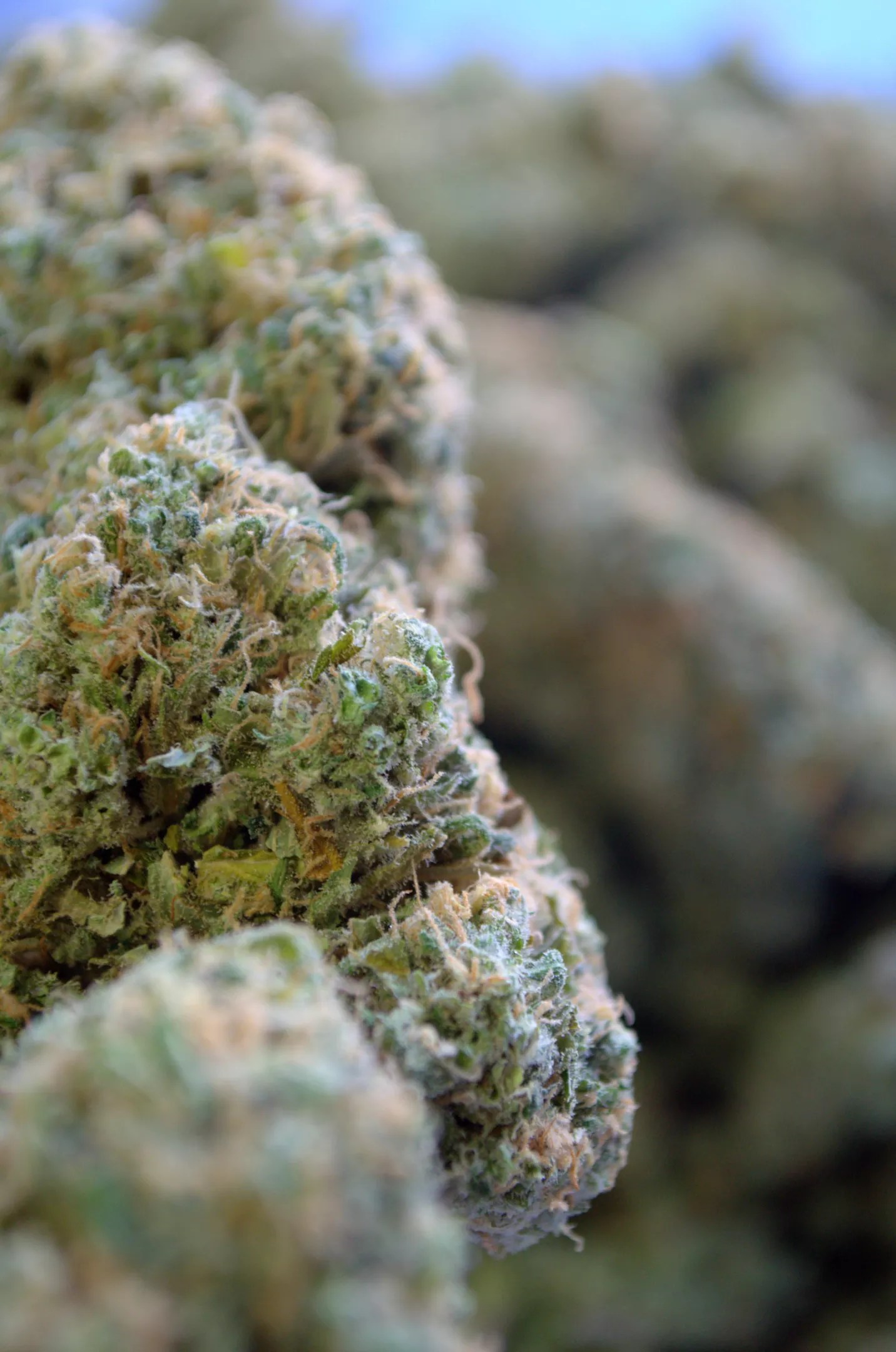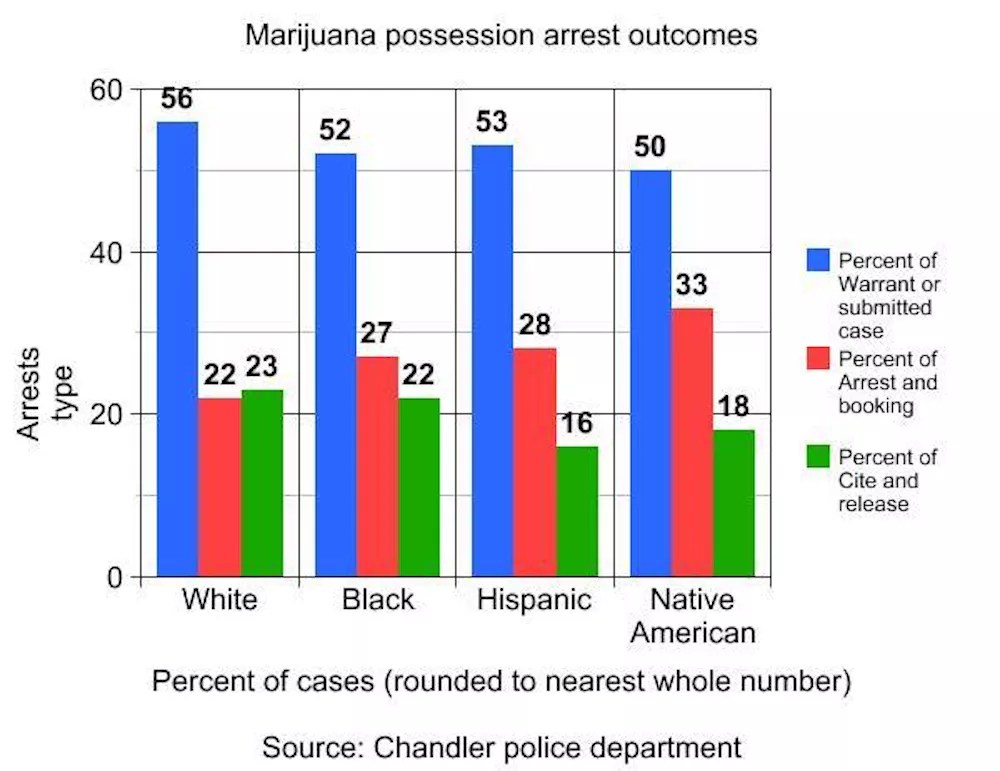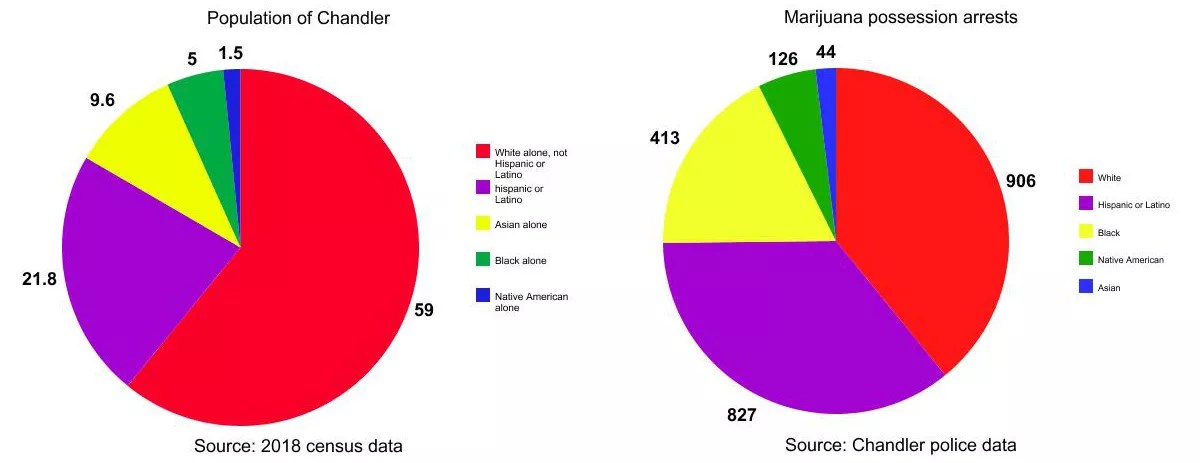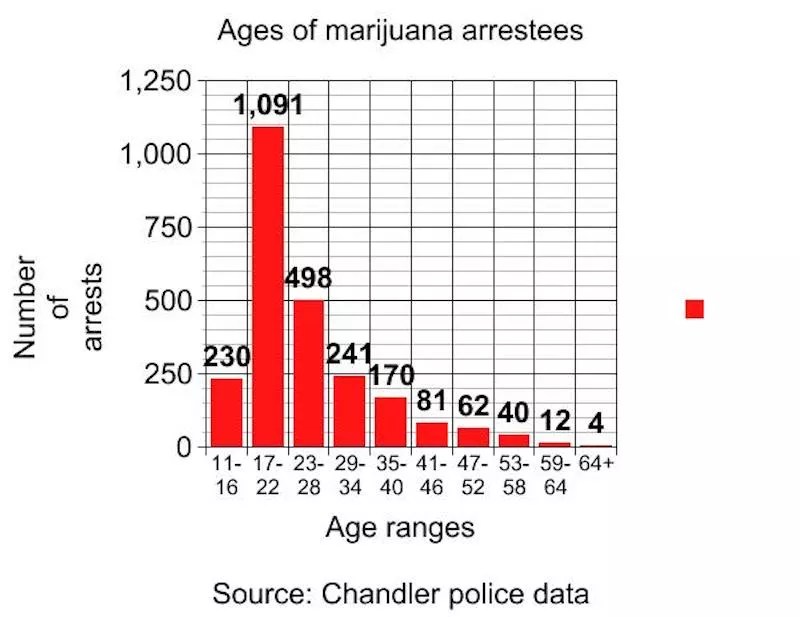
Lindsey Bartlett

Audio By Carbonatix
Around 9 p.m. on April 22, Michael was driving home with his son when Chandler police officer Brenton Lange pulled him over for driving with a broken headlight.
Michael gave Lange his license and registration, but when Lange checked his license, he found it had been suspended just days before because Michael had failed to pay some fines for prior traffic tickets. Lange decided to arrest Michael, Chandler police records show.
Another officer searched the vehicle and found a container with marijuana and a small blue pipe on the floor near the front seat. Lange read Michael his Miranda rights. Michael said he didn’t have a medical marijuana card but that the weed wasn’t his, he said, adding that it might belong to – as the officer put it – “a troubled youth who he allowed to live with him.”
Lange handcuffed Michael. The other officer called a tow company as Michael’s son stood by, watching it all unfold. The boy called his mom to pick him up, and she told police there was no way the weed was Michael’s. She suggested it may belong to the registered owner of the vehicle, from whom Michael had recently acquired the car.
Michael was fingerprinted and photographed at the Chandler police station. His car was towed. All for three grams of marijuana.
Michael’s experience was just one of the 2,430 marijuana-possession arrests Chandler police have made since 2013, an analysis of booking data from Chandler’s open data portal shows. (Those arrested for marijuana possession may have also been charged with other crimes, but the data does not make that clear.) While the data alone does not reflect the full circumstances of each arrest, it does show racial disparity in the way Chandler handles its marijuana possession arrests, and also shows disparities in the age and gender of arrested people.

Chandler marijuana possession arrests 2013-2019
Phoenix New Times graphic, with data from Chandler PD
What Michael and thousands of others were arrested for is no longer a crime in 10 states, but in Arizona, possession of any amount of weed is technically a felony, and those caught with it suffer the consequences.
On average, between 2013 and 2018 Chandler police arrested 385 people a year for marijuana possession. Chandler’s arrest data includes the race, gender, age, and ethnicity of arrestees, as well as the location of the arrest and a variety of other details specific to each individual arrest. Of all the cities in Maricopa County, Chandler’s booking data is by far the most comprehensive, making it easy to examine the city’s marijuana-possession arrests as a window into police enforcement of marijuana laws in Arizona.
Data shows that 906 of the 2,430 total marijuana arrestees were listed as white in the “arrestee ethnicity” column, 827 were Hispanic or Latino, 413 were black, 126 were American Indian, 101 ethnicity entries were left blank, and the remaining 57 were a variety of other ethnicities.
Crunching the Chandler marijuana possession numbers: 37.3 percent of those arrested since 2013 were white, 34 percent were Hispanic or Latino, 17 percent were black, and 5.2 percent were Native American.
Chandler has a population of about 236,000 according to 2018 census estimates. A majority of the population – 59.1 percent – are non-Hispanic white people, 21.8 percent are Latinos, 5.2 percent are black, and 1.5 percent are Native Americans. Nearly 10 percent of Chandler’s population is Asian; Asian people accounted for 44 marijuana possession arrests made from 2013 to 2019.
The arrest rate is relatively high for black people in comparison to their white neighbors, who make up nearly 60 percent of Chandler’s population but only 37.3 percent of possession arrests, despite the fact that black people and white people use marijuana at similar rates.

Population of Chandler; marijuana possession arrests
Phoenix New Times graphic, with data from Chandler PD and the census
Of the 906 white people arrested for marijuana possession, slightly more were given a citation or promise to appear without going to jail (21.7 percent) than were arrested, booked, and jailed (20.9 percent). Fifty-six percent of arrestees had their arrest type listed as “warrant or submitted case.”
While white people were more likely to have their cases resolved via cite-and-release, black people were arrested and booked on new charges more often than they were cited and released. That difference was even starker for Hispanic people, whose percentage of cases that led to arrest and booking was 12 points higher than that of their percentage of cases that were resolved via cite-and-release.
The data also shows that far more of the arrestees were men (80 percent) than women. Nearly half of those arrested were young. Chandler police arrested 1,091 people between the ages of 17 to 22, (44.9 percent of all marijuana possession arrests), and more than 230 people between the ages of 11 to 16.

Age ranges of marijuana possession arrestees
Phoenix New Times graphic, with data from Chandler PD open portal
The data indicates that a majority of the children and teenagers arrested for marijuana possession had their arrest type listed as “warrant or submitted case,” meaning the person was either arrested and booked because he or she had a warrant, or was arrested without being booked because charges were submitted directly to the court.
However, some 14- and 15-year-olds were arrested and booked, meaning they were physically booked into jail and had their initial appearance before a judge, who either set a bond or released them on their own recognizance.
A spokesperson for the Chandler police department told New Times that officers frequently submit charges directly to the court, particularly if the arrestee is a juvenile without any criminal history, in order to avoid physically booking people and making them spend time in jail before the county attorney’s office decides whether or not to prosecute.
The policy means many marijuana-possession arrests by Chandler PD are resolved without having the arrestee spend time in jail prior to an initial appearance before a judge. About 53 percent of all marijuana-possession arrests were classified as “warrants or submitted cases.”
An additional 19 percent of arrests were resolved via cite-and-release, which means people are still accused of charges, arrested, and fingerprinted, but are not physically booked into jail. Instead, police give them a ticket or citation with a court date to follow. About 25 percent of arrests led to time in jail prior to an initial appearance before a judge. The remaining percentage of arrest types were left blank.
Michael’s arrest was listed in the data as a cite-and-release case. A Chandler police officer described arresting the father, handcuffing him, and fingerprinting him in the arrest paperwork. But after bringing Michael down to the main station, Officer Lange told Michael he would submit charges once the lab results came back positively identifying the three grams of weed he had in his car. Lange indicated that he released Michael that evening.
If the test results are positive for marijuana, Michael’s felony will likely get turned into a misdemeanor, or he’ll be offered a pre-prosecution or “diversion” deal that’ll result in an order to complete a TASC drug-treatment program. Since he has no prior record of arrest for marijuana possession, he cannot be sentenced to jail time for marijuana possession under a 1996 voter-approved law, although Lange also wrote up Michael for driving with a suspended license and possession of drug paraphernalia.
Michael did not respond when contacted for this story, and New Times is withholding his last name in order to avoid creating a further record of his arrest.
Michael’s arrest almost certainly does mean that the man whose license was suspended for not paying traffic fines will likely be forced to pay over $1,000 in fines and fees for the TASC program, and take regular urine tests.
Last August, a legal rights group sued Maricopa County Attorney Bill Montgomery over the TASC program, alleging that the system allows wealthy people to buy their way off diversion quickly, while poor people risk being expelled from the program and prosecuted for a felony simply because they cannot afford to pay.
One 21-year-old woman who entered the program in 2017 ended up leaving college because she would otherwise be unable to attend all the drug tests the program required. When she struggled to make the payments, she began selling her blood plasma to cover the cost. She eventually became homeless, but still she was unable to apply for a reduced fee.